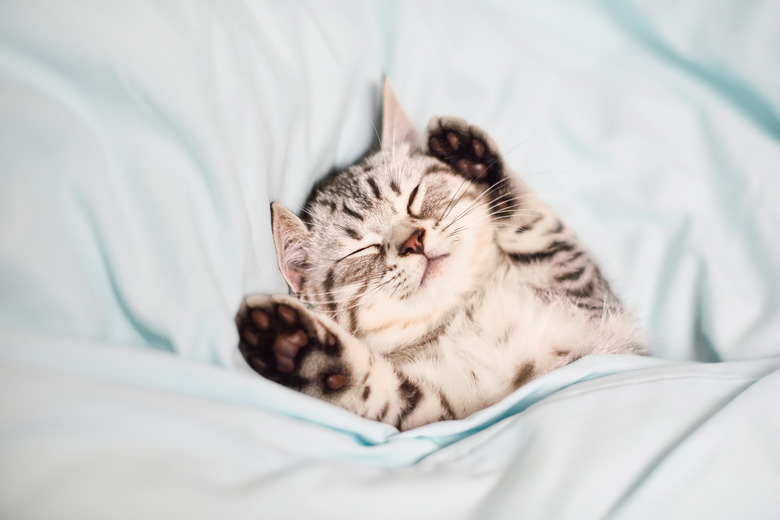How To Clear A Cat's Stuffy Nose
No one likes dealing with a stuffy nose. Breathing becomes a chore, the senses of smell and taste are gone or greatly diminished, and symptoms like sneezing and nasal discharge may accompany the stuffiness. You probably have your own remedies to deal with the stuffy noses of you and your family, but many of these remedies aren't suitable when it is your cat who is suffering. While a cat with severe breathing difficulties needs veterinary attention, you can probably handle mild feline stuffiness on your own.
Reasons for feline stuffy noses
Reasons for feline stuffy noses
Stuffy noses in cats result from various causes, but as many as 90 percent of acute rhinitis cases in cats are due to herpes and caliciviruses, according to Vet Street. Affected cats may only experience the full effect of these viruses in their initial outbreak — with symptoms such as discharge from both nostrils, fever, and goopy eyes — but they continue to carry the virus and have occasional rhinitis episodes.
Other reasons for stuffy cat noses include allergies, bacterial or fungal infections, tooth infection, a foreign body in the nasal cavity, or parasite infestation. The latter most often occurs in outdoor cats and involves botfly eggs hatching into larvae within the nasal cavity. A bloody, pus-like discharge comes out of the affected nostril, and the cat may paw at her face. The worst-case scenario for a feline stuffy nose is a malignant nasal tumor.
If your cat's stuffy nose does not clear up within a few days, take her to the vet for an examination and diagnosis. Because she can't smell well with a stuffy nose, keep an eye on her food and water intake. A cat with a stuffy nose is in danger of becoming dehydrated if she isn't eating wet food or drinking water.
Feline shower therapy
Feline shower therapy
No, showering your cat won't clear up her stuffy nose, although it is likely to cause multiple scratches on your body. However, bringing your cat into the bathroom while you take a shower may alleviate some of her discomfort. The steam from the shower can open up her nasal passages.
Giving lysine
Giving lysine
The amino acid lysine can help stop a herpes virus from replicating and thus relieves rhinitis. Lysine for cats in gel form is available online or in pet stores, and that's generally an easier form of the supplement to give cats than a tablet. Follow the directions on the container for the right amount for your cat's size and the frequency of use. Place the lysine gel on her paw, and she should lick it off.
Lysine will also boost your cat's immune system, so if she has ongoing issues with nasal stuffiness, you may want to make lysine supplementation part of your daily routine. Always check with your vet to make sure long-term lysine supplementation is appropriate for your pet.
Vaporizing the cat
Vaporizing the cat
Vaporizing doesn't refer to zapping your cat into the unknown. Instead, as PetMD suggests, it means placing her in a room with a vaporizer for about half an hour daily. The device, also known as a humidifier, loosens mucus so the cat can breathe more easily. Place a mentholated topical ointment in the vaporizer for added help, but do not place this medication on the cat's nose.
Saline solutions
Saline solutions
If your cat is amenable, you might try using saline nasal drops in her nose for congestion relief. The Veterinary Expert notes that most cats don't object to saline drops applied to the nostrils. Use saline drops designed for pets or human infants, but don't apply any other type of nasal spray to a cat's nose. The types of medicated nose drop available over the counter for people are dangerous to give to felines.
Always check with your veterinarian before changing your pet's diet, medication, or physical activity routines. This information is not a substitute for a vet's opinion.
